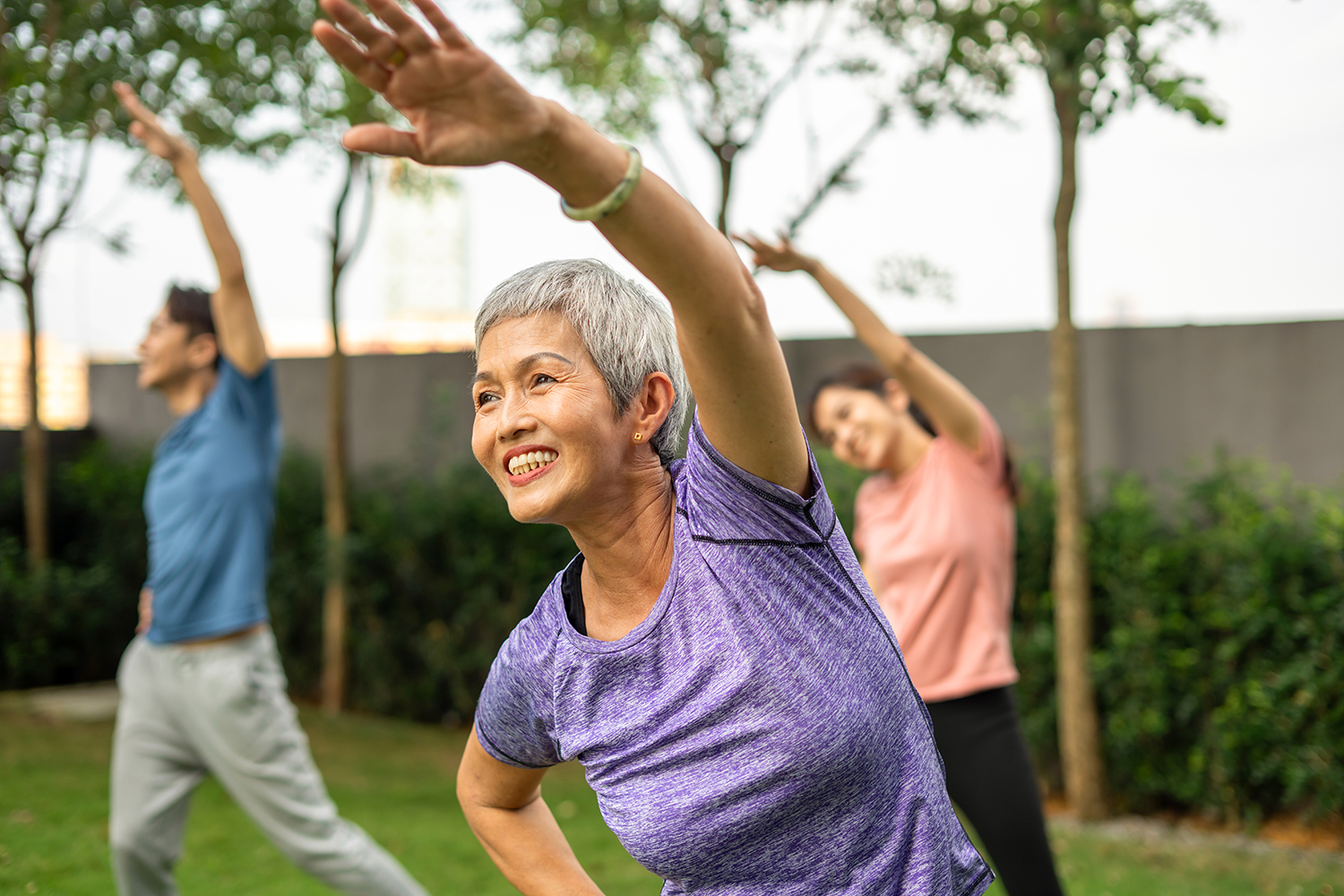How to Keep Your Body and Mind in Sync: The Wellness Trio of Exercise, Nutrition, and Sleep
Feeling your best isn't about following the latest health trend or committing to a strict routine—especially as you get older. It’s about balance. And when it comes to staying energized, independent, and mentally sharp, three essential pieces work together like a well-oiled machine: exercise, nutrition, and sleep.
Think of them as your personal wellness trio. When one area is out of sync, the others feel it too. But when they’re in balance, they support each other and help you move through your days with more strength, clarity, and confidence.
Let’s take a closer look at how each part of the trio plays a role and how they work together to help you feel your best.
Why balance matters more as you age
As we get older, our bodies naturally change. Our muscles may lose strength, our metabolism slows down, and our sleep patterns might shift. At the same time, we may develop new health concerns, from arthritis to heart disease or diabetes.
That’s why it’s more important than ever to take care of the basics: moving your body, eating nourishing foods, and getting quality rest. These three areas are closely connected—and finding balance among them can:
- Improve your mood
- Boost your energy
- Strengthen your immune system
- Help manage chronic conditions
- Improve memory and focus
- Keep you feeling independent longer
Exercise: Moving for strength, balance, and energy
You don’t need to run a marathon or join a fancy gym to benefit from exercise. Even gentle movement can do wonders for your body and mind.
The benefits of movement
Moving your body is one of the best ways to stay healthy and strong as you get older. When you’re active, your energy levels go up, and you’ll feel less tired during the day. It also helps make your muscles stronger and improves your balance, which lowers the risk of falling—a common concern for many seniors.
If you deal with stiff or achy joints, regular movement can help loosen them up and reduce pain. Staying active is also great for your heart. Moving more keeps your blood flowing, which is important for heart health and overall circulation.
But exercise isn’t just about your body—it’s good for your mood, too. Being active helps your brain release chemicals that make you feel happy and relaxed. Plus, if you move regularly, you’ll likely sleep better at night and wake up feeling refreshed.
Easy Ways to Get Moving
Getting active doesn’t have to be complicated. There are plenty of simple ways to add movement to your day that can help improve your health and energy levels.
- Go for a 15-minute walk in the morning or after dinner
- Try chair exercises or stretching routines
- Do light resistance exercises with bands or soup cans
- Take a water aerobics class or practice gentle yoga
- Add movement into daily tasks: dance while cleaning, march in place while watching TV
The key is consistency. Just 10–30 minutes a day can make a big difference.
How Exercise Supports Sleep and Nutrition
Staying active during the day can significantly improve your sleep quality. Physical movement helps your body feel more relaxed, making it easier to fall asleep faster and stay asleep longer. Regular exercise also has a positive effect on your appetite, encouraging healthier food choices that fuel your body and give you the nutrients it needs. Additionally, physical activity plays a role in regulating blood sugar levels, which not only supports overall health but also contributes to better rest at night.
Nutrition: Fueling Your Body and Brain
Healthy eating isn’t about dieting—it’s about giving your body the fuel it needs to keep going strong. As you age, your calorie needs may go down, but your need for nutrients goes up.
The Role of Good Nutrition
Good nutrition plays a crucial role in keeping your body strong and resilient as you age. The food you eat helps feed your muscles, supporting healing and recovery from everyday wear and tear. A balanced diet also works to regulate blood sugar and cholesterol levels, which are essential for managing energy and protecting your heart health.
Nutrition is just as important for your mind as it is for your body. Nutrient-rich foods support brain health and memory, helping you stay sharp and focused. They also keep your digestion regular, promoting comfort and overall gut health. Finally, eating well boosts your immune system, making it easier to fight off illnesses and stay active and independent.
Simple Nutrition Tips for Seniors
Healthy eating is about making small, practical changes that fit into your everyday routine. By focusing on wholesome, nutritious foods, you can fuel your body and support your overall well-being.
- Eat lean proteins like chicken, eggs, beans, or fish to maintain strength
- Choose whole grains like oatmeal, brown rice, or whole wheat bread
- Add plenty of colorful fruits and vegetables for vitamins and fiber
- Use healthy fats like olive oil, avocado, or nuts
- Drink plenty of water, even if you don’t feel thirsty
Aim for smaller, balanced meals throughout the day to keep energy levels steady.
How Nutrition Supports Sleep and Exercise
The foods you choose to eat can play an important role in supporting both restful sleep and effective physical activity. Nutrient-rich options, like spinach and bananas, are packed with magnesium—a mineral that promotes relaxation and can help you fall asleep more easily and stay asleep longer. For physical activity, complex carbohydrates and proteins provide steady, lasting energy, helping you stay active without the sudden drops in energy that come from processed foods. Proper hydration and nutrient-dense foods further enhance exercise recovery, reducing soreness and supporting muscle repair so you can stay on track with your activity goals.
Sleep: The Foundation of Wellness
Sleep isn’t a luxury—it’s essential to health. But many seniors struggle with falling or staying asleep. If that’s you, know that better sleep is possible, and it has a big impact on how you feel during the day.
The Power of Good Sleep
Getting enough good-quality sleep is one of the best ways to support your overall health and well-being. While you rest, your body works hard to repair itself, healing tissues and restoring energy for the day ahead. Sleep also plays a key role in maintaining memory and concentration, helping you stay sharp and focused.
A good night’s sleep does more than recharge your body—it balances your mood and reduces irritability, making it easier to handle daily challenges. It also regulates hormones that control hunger and blood sugar levels, promoting steady energy and healthy eating habits. Over time, consistent sleep can reduce the risk of depression, heart disease, and other chronic conditions, giving you a strong foundation for better health.
Tips for Better Sleep
Good sleep starts with setting up a routine that works for your body and lifestyle. By making small adjustments to your daily habits and sleep environment, you can set the stage for better rest and overall health.
- Go to bed and wake up at the same time every day
- Avoid caffeine or large meals late in the day
- Create a calming bedtime routine (reading, soft music, a warm bath)
- Keep your bedroom cool, dark, and quiet
- Limit screen time (TV, phone, tablet) at least 1 hour before bed
- Get sunlight and fresh air during the day—it helps regulate your internal clock
Talk to your doctor if sleep issues persist—sometimes medications or other conditions are to blame.
How Sleep Supports Exercise and Nutrition
Good sleep lays the foundation for staying active and eating well. When you get enough rest, your body feels energized and ready to move, making it easier to stay active during the day. On the other hand, a lack of sleep can trigger sugar cravings and lead to poor food choices, which may disrupt your energy levels and overall health. Sleep is also essential for muscle recovery—rested muscles repair themselves faster and stay stronger, allowing you to maintain regular physical activity and benefit more from exercise.
Bringing It All Together: Your Wellness Trio in Action
When sleep, nutrition, and exercise are working together, they create a powerful cycle of wellness:
- Sleep Well: Wake up rested, feel motivated to move and eat well
- Move Daily: Boost energy, regulate appetite, sleep more soundly
- Eat Right: Fuel movement, stabilize mood, promote deeper sleep
You don’t have to be perfect in every area to feel better. But when you give each part of your wellness trio a little attention, the results add up—and you’ll notice more energy, independence, and peace of mind.
Quick Daily Checklist for Staying in Sync
Want to keep your body and mind in balance? Try these small steps each day:
- Did I move my body, even for 10–15 minutes?
- Did I eat at least one colorful fruit or vegetable?
- Did I drink water throughout the day?
- Did I take time to wind down before bed?
- Did I get some fresh air or sunlight?
Over time, these actions become natural—and the benefits can be felt in everything from your energy levels to your mood and mobility.
The goal isn’t perfection. It’s balance. And when you find that balance between movement, nourishment, and rest, you give yourself the best chance to thrive—physically, mentally, and emotionally.
Your body and mind are on the same team. Keep them in sync, and you’ll feel the difference every day.
Remember, when you’re thinking about starting a new nutrition or exercise routine, check in with your doctor. You want to make sure you are taking the right steps to support any conditions you may have.
If you are a current patient, make an appointment to speak with your care team soon. If you haven’t joined us yet, click here to find a center near you and visit us! We’d love to meet you.



